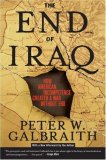Summary | Excerpt | Reviews | Beyond the Book | Read-Alikes | Genres & Themes | Author Bio

Critics' Opinion:
Readers' Opinion:
First Published:
Jul 2006, 272 pages
Paperback:
Jun 2007, 288 pages
 Book Reviewed by:
Book Reviewed by:
BookBrowse Review Team
Buy This Book
This article relates to The End of Iraq
map showing Kurdish and Shia areas or Iraq
The Republic of Iraq (about the size of California) spans the lands of ancient Mesopotamia, (between the Tigris and Euphrates Rivers), the northwestern end of the Zagros mountain range and parts of the Syrian Desert. Mesopotamia was home to the world's first known civilization, the Sumerians, who were followed by the Akkadians, Babylonians and Assyrians. Between them they were responsible for the earliest known writing, establishing mathematical principles and laws, developing irrigation techniques, the wheel and much else. For four centuries from the 6th century BC the Neo-Babylonian Empire was incorporated into the Persian Empire, then it fell under Greek rule for a couple of centuries, before returning to the Persian Empire until the 7th century.
The city of Baghdad was built in the 8th century and, for five centuries, was the leading city of the Arab world until it was sacked in the 13th century.
The Ottoman Empire ruled much of the Middle East, including the area around Baghdad, from the 16th century to the end of World War I. The Treaties of Sèvres and Lausanne carved up the Middle East into various mandates. The UK had the mandate for the area that is now Iraq, which at the time was formed out of three former Ottoman regions: Mosul, Baghdad, and Basra which, for three out of the four centuries of Ottoman rule, had been ruled from Baghdad.
The British selected the Hashemite* king, Faisal (formerly ruler of Syria) to rule Iraq on their behalf; other ministers and officers were selected from the Sunni (who, apparently, represented the majority of the population at the time). In 1932, Iraq was granted independence although the British retained military bases and transit rights; Faisal died in 1933.
In 1941, the UK invaded Iraq fearing that the government, which strongly leaned towards Nazi ideology, would cut oil supplies. The occupation ended in 1947 with the reestablishment of the Hashemite monarchy, which ruled until 1958 when it was overthrown by the Iraqi Army in a coup d'etat.
In 1963, there was another coup; followed by another in 1968, when the Arab Socialist Baath Party (Sunni) took control. The Baath party gradually came under the control of Saddam Hussein al-Majid al Tikriti, who consolidated his power base in 1979 by killing many of his opponents.
Then followed the Iran-Iraq war (1980-1988) which ended in stalemate largely due to American and Western support for Iraq. In 1990 Iraq invaded Kuwait (disputing the boundary that had been established in 1913 and demarcated in further agreements in 1932 and 1963). Shortly after, a coalition of 34 nations removed Iraqi forces from Kuwait in four days, but chose not to topple Hussein's government.
In 2003 American-led forces attacked Iraq. In October 2005, almost two-thirds of eligible Iraqis came out to vote whether to accept or reject the new constitution. The constitution passed with a 78% majority but support varied widely by region. Shia and Kurdish communities overwhelmingly supported the constitution, but Sunnis rejected it. Three majority Arab Sunni provinces in the North and Northwest of Iraq voted heavily against it: Salah ad Din, 82% against; Ninawa, 55% against; and Al Anbar, 97% against.Map showing land use and regions.
Under the terms of the constitution fresh elections were conducted in December 2005, but the three major ethnic groups voted along ethnic lines and no consensus was reached.
*The Hashemites trace their ancestry fromHashim ibn Abd al-Manaf (died c.510 AD), the great-grandfather ofMuhammad
Note: As always, we do our best to provide accurate information as concisely as possible. If you find fault with the facts as presented, please do let us know so that we can research and correct as necessary.
Filed under Places, Cultures & Identities
![]() This article relates to The End of Iraq.
It first ran in the June 7, 2007
issue of BookBrowse Recommends.
This article relates to The End of Iraq.
It first ran in the June 7, 2007
issue of BookBrowse Recommends.





The Flower Sisters
by Michelle Collins Anderson
From the new Fannie Flagg of the Ozarks, a richly-woven story of family, forgiveness, and reinvention.

The House on Biscayne Bay
by Chanel Cleeton
As death stalks a gothic mansion in Miami, the lives of two women intertwine as the past and present collide.

The Funeral Cryer by Wenyan Lu
Debut novelist Wenyan Lu brings us this witty yet profound story about one woman's midlife reawakening in contemporary rural China.
Your guide toexceptional books
BookBrowse seeks out and recommends the best in contemporary fiction and nonfiction—books that not only engage and entertain but also deepen our understanding of ourselves and the world around us.